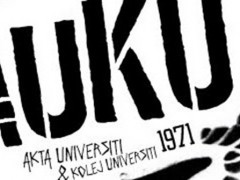الأخبار

Tertiary studies on the cusp of change
التاريخ : 19 July 2019
المحرر : Roslan Bin Rusly
الفئة : News
غرد هذا
A HIGH-LEVEL committee of the Education Ministry is conducting a detailed study of the Universities and University Colleges Act 1971 (UUCA) to recommend more autonomy and independence in matters of governance, administration and financial management of public universities.
The rules relating to the university’s power over staff and students are also being scrutinised.
The UUCA has been amended seven times since its enactment.
Not all amendments were for the good of higher education but I am optimistic that due to the changed political atmosphere since the 14th General Election, some good will definitely come out of the current exercise.
We need honest questioning of some hallowed framework assumptions that surround Malaysian higher education.
Admittedly, there can be no right answers to the question of what the role of a university is or ought to be in an Asian context. Views may differ from age to age, society to society and university to university.
In my humble view, a university is not merely a training for employment. Besides careers, universities must build character and provide all-round development.
Higher education must be about knowledge and not just utility; learning and not just earning.
A university is imbued with multi-faceted functions.
First and foremost, it is a temple of learning and a storehouse of the knowledge and wisdom of the past.
It is a receptacle of art, culture and science and a mirror of humanity’s great heritage.
But it is much more.
International Islamic University Malaysia rector Prof Tan Sri Dzulkifli Abdul Razak believes that besides knowledge dissemination, a university must be involved in knowledge generation, knowledge application, knowledge assimilation and knowledge evaluation.
Members of the university community must not only be mirrors that reflect the light produced by others; they must be the source of new illumination.
A crucial factor in a university’s eminence is qualified academicians with proven research abilities.
A good part of the research should be “applied research” to address and resolve the burning issues of the times like the impending environmental catastrophe, poverty, injustice and marginalisation.The university must be the nucleus of ideas for the nation’s economic and industrial development.
However, the importance of research must not be exaggerated.
While researchers should be adequately supported and rewarded, this should not be at the expense of those who excel in teaching, in community service and character-building. Also, we must guard against the fact that in many citadels of learning, much of the research is a facade.
It is show over substance and its primary purpose is to capture an available grant and to create a favourable statistical record for purposes of promotion and rating.
Any impact on the alleviation of the problems of society is often not important.
Unethical practices abound –from the rigging of findings to support the grant-giver, to plagiarism, to the exploitation of the effort of one’s subordinates.
Along with research, it is the university’s role to build character; to inculcate a passion for justice and the quality of humanity; to impart a social conscience and a social perspective.
A university worth its name should not be a chambermaid to the existing social order.
It should be a harbinger of things to come, an architect of an emerging restructured society.
It must shape reality and not be its servile agent. Perhaps in all societies but especially in Asia and Africa, universities must be part of the machinery of social engineering and social restructuring.
It is a university’s job to reach out to the marginalised sections of society, irrespective of race, religion, region or gender, and to give them opportunities for upward mobility.
University education should be the key to good citizenship, responsible parenthood and harmonious community relationships.
Education should contribute to nation-building by fostering respect for each other’s cultures and traditions.
We have failed badly in this area.
University training should be designed to suit the needs of the professions and the industries.
The courses we introduce, the syllabi we draft, the training we impart, the educators we hire and the methodology we adopt, must straddle the divide between the theory in the book and the practices in the marketplace.
However, it is an exaggeration to regard “employability” as the supreme criterion of the success of a university and the raison d’etre for a university’s existence.
A citadel of learning has, or ought to have, vastly broader
aims than to produce products for the marketplace.
As I reflect over tertiary education over the last four decades, I note with sorrow some of the following developments:
> The bureaucratisation of universities and their loss of autonomy;> The commercialisation of our citadels of learning;
> The demise of liberal education (by liberal education, I mean broad-based learning that promotes activity of thought and receptivity to beauty and humane feeling);
> The excessive pandering to the professions;
> The metamorphosis of universities into factory assembly lines;
> The aloofness of universities from society; and
> The rigidity (and sometimes irrelevance) of entry criteria.
There are, of course, no simple or correct solutions to the above problems and one has to walk the tightrope of reconciling rich and conflicting considerations.
Awareness of the problems is, however, the first step to their resolution.
Emeritus Prof Datuk Dr Shad Saleem Faruqi is a holder of the Tunku Abdul Rahman Chair at Universiti Malaya’s law faculty. The views expressed here are entirely the writer’s own.
TAGS / KEYWORDS:Shad Saleem Faruqi , Reflecting On The Law , Universities
image: https://www.thestar.com.my/~/m...
Shad Saleem Faruqi
Read more at https://www.thestar.com.my/opi...









